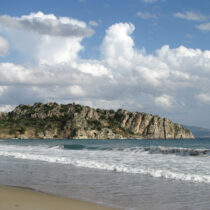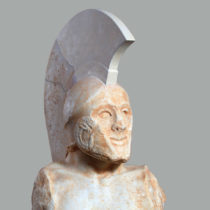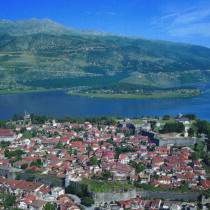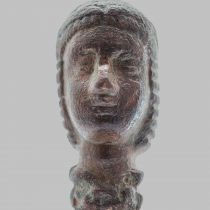One of the world’s oldest clocks unearthed in Egypt
Ostracon with a hole in its base and a drowing of a semicircle divided into 12 sections was used to measure the time -now and in the afterlife.
50,000 skeletons in central London
Archaeologists announced they have found an unknown burial site, which could be the final resting place for as many as 50,000 victims of the Black Death (plague), more than 650 years ago
Masterpieces from the Picasso Museum to Zagreb
Picasso exhibition at the palace of Klović opens on March 23rd.
Medieval knight found in Scotland parking lot
A 500-year old skeleton of a man alongside a stone slab carved with a cross and sword was found in a parking lot in Edinburgh
Ancient Chinese coin found on Kenyan island
Evidence of trade between China and east Africa decades before European explorers set sail and changed the map of the world.
Images of the Art Museum
Conference investigating how the instiution of the museum has been visualized and translated into different kinds of images and how these images have affected our perception of these institutions.
Princesses’ exhibition extended
The exhibition “Princesses of the Mediterranean in the Dawn of History”, presented at the Cycladic Art Museum, will be on show until May 8.
The Dark Side of the Sun
Art from the period depicts Amarna as an idyllic city of plenty, but the cemetery tells a different story.
The Archaeological Work in Macedonia and Thrace
This year's meeting will take place at the Aristotle University of Thessaloniki, on March 20th-22nd, 2013.
Digital Presentation and Preservation of Cultural and Scientific Heritage
DiPP2013 aims at presenting innovative results, research projects and applications the digital presentation and preservation of cultural and scientific heritage.
Stolen Rembrandt recovered in Serbia
Rembrandt’s stolen “Portrait of the Father” (c. 1630) has been recovered in an operation carried out by the Department of Criminal Police and Novi Sad Criminal Police.
Imagining the Balkans
This travelling exhibit “Imagining the Balkans. Identities and Memory in the long 19th century”, focuses on the constitution and evolution of modern nations in South-East Europe during the 19th century.
Stonehenge builders travelled from far, say researchers
Thousands of people came from across Britain to help build Stonehenge, experts investigating the origins of the monument have said.
Phaistos and Ayia Triada in the Prepalatial period
The next Minoan Seminar will be given by Simona Todaro (Universita di Catania).
Ice Station Antarctica: 50,000 visitors
More than 50,000 visitors have seen the exhibition “Ice Station Antarctica” at the cultural centre of the Foundation of the Hellenic World “Hellenic Cosmos”.
Acropolis museum celebrates Greek National Holiday
On the occasion of the Greek National Holiday of 25th March, the Acropolis Museum organizes workshop presentations and music events.
The most accurate model of the Antikythera Mechanism
John Seiradakis and Kyriakos Efstathiou presented for the first time to the public the most recent model of the Antikythera Mechanism and the results of their long-lasting research about the ancient "computer".
British Museum reunites Roman marble panels split for 2,000 years
Two spectacular Roman marble panels from Herculaneum have been reunited at the British Museum for the first time in almost 2,000 years.
Ancient settlement discovered in Azerbaijan
Ceramics, pottery pots, human and animal bones, stone tools, various agricultural tools made from limestone, different types of stone graters and mortars were found during the excavations.
Mycenaean settlement in Antikalamos
The remains of a Mycenaean settlement have been found near Kalamata.
Discovering the oldest seafaring ship
On Thursday, March 14th Professor of Nautical Archaeology Cemal Pulak will give a lecture about the Uluburun shipwreck at the Acropolis Museum.
Face to face with a Saint
An interdisciplinary research group of the University of Crete, the Technological Institute of Crete and the University Hospital of Heraklion created a facial reconstruction of Saint Eutychius, based on the saint's skull.
The tough life of ancient Upper Egypt’s rich and famous
The governors of ancient Asswan in Egypt suffered from malnutrition and infectious diseases, dying before they were 30 years old, according to research on the Qubbet el-Hawa mummies




























